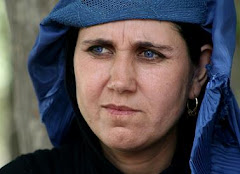(New York) - The Afghan government should conduct an independent investigation into the suspicious death in custody of a suspect held by its intelligence service, the National Directorate of Security (NDS), Human Rights Watch said today.
On December 7, 2009, Abdul Basir died while in an NDS detention facility. Later that day the agency told family members that Basir committed suicide by throwing himself out of a window. On December 8 the authorities returned Basir's body to his family. Photographs obtained by Human Rights Watch show the deceased with small dark circles on his forehead, blackened cuts on his back, bruising in several places, and a large cut to his shin.
"Any attempts by the security directorate to block an investigation into Basir's death will only fuel suspicions of abuses," said Brad Adams, Asia director at Human Rights Watch. "The attorney general and the Afghan Independent Human Rights Commission should promptly investigate the cause of death, and the autopsy report should go to the family."
NDS Department 17, the intelligence service's investigatory branch, had detained Basir for approximately one month in connection with the October 28 attack on a Kabul guesthouse that housed many United Nations staff. Eight civilians died in the attack. Abdul Basir's father and two brothers were also detained and remain in custody.
An NDS official told family members that Basir's father, Zalmai, signed a statement confirming that Basir had committed suicide and that an autopsy was not required. The family told Human Rights Watch that NDS officials told them that if they buried the body, Basir's brothers and father would be released.
However, concerned that the marks on Basir's body may have been signs of torture, the family took the body to the Forensic Department of the Health Ministry where an autopsy was carried out. The findings have not been made public. The family reported that security agency officials later came to the house where the body was held and gave them a message to bury the body. When the family tried to take the body to parliament, they said, agency vehicles blocked their way.
One Afghan media outlet informed Human Rights Watch that they received phone calls from the NDS telling them not to report the incident, which has had limited coverage in the Afghan media.
Human Rights Watch has received many reports of torture during interrogations by Department 17. The NDS continues to deny regular access to all of its facilities to the Afghanistan
Independent Human Rights Commission and to the International Committee of the Red Cross.On December 7, 2009, Abdul Basir died while in an NDS detention facility. Later that day the agency told family members that Basir committed suicide by throwing himself out of a window. On December 8 the authorities returned Basir's body to his family. Photographs obtained by Human Rights Watch show the deceased with small dark circles on his forehead, blackened cuts on his back, bruising in several places, and a large cut to his shin.

"Any attempts by the security directorate to block an investigation into Basir's death will only fuel suspicions of abuses," said Brad Adams, Asia director at Human Rights Watch. "The attorney general and the Afghan Independent Human Rights Commission should promptly investigate the cause of death, and the autopsy report should go to the family."
NDS Department 17, the intelligence service's investigatory branch, had detained Basir for approximately one month in connection with the October 28 attack on a Kabul guesthouse that housed many United Nations staff. Eight civilians died in the attack. Abdul Basir's father and two brothers were also detained and remain in custody.

An NDS official told family members that Basir's father, Zalmai, signed a statement confirming that Basir had committed suicide and that an autopsy was not required. The family told Human Rights Watch that NDS officials told them that if they buried the body, Basir's brothers and father would be released.
However, concerned that the marks on Basir's body may have been signs of torture, the family took the body to the Forensic Department of the Health Ministry where an autopsy was carried out. The findings have not been made public. The family reported that security agency officials later came to the house where the body was held and gave them a message to bury the body. When the family tried to take the body to parliament, they said, agency vehicles blocked their way.
One Afghan media outlet informed Human Rights Watch that they received phone calls from the NDS telling them not to report the incident, which has had limited coverage in the Afghan media.
Human Rights Watch has received many reports of torture during interrogations by Department 17. The NDS continues to deny regular access to all of its facilities to the Afghanistan
The UN Principles on the Effective Prevention and Investigation of Extra-Legal, Arbitrary, and Summary Executions provide that there "shall be thorough, prompt and impartial investigation" of all suspected cases of unnatural death in custody. The inquiry shall "determine the cause, manner and time of death, the person responsible, and any pattern or practice which may have brought about that death. It shall include an adequate autopsy, collection and analysis of all physical and documentary evidence and statements from witnesses." The detailed methods and findings of the investigation are to be made public, and the government should ensure that persons identified by the investigation as having participated in an unlawful killing are brought to justice.
Despite numerous credible allegations of torture in NDS detention, the Afghan government and international donors have failed to make reform of detention and interrogation practices a priority. The agency continues to operate without a transparent legal framework that defines its powers to investigate, arrest, and detain.
"The genuine threat to Afghanistan posed by extremist groups can never justify the resort to torture," Adams said. "Abusing suspects will only undermine the legitimacy of the Afghan government and serve as a recruiting sergeant for the insurgency."
Human Rights Watch



.jpg)




0 نظرات:
Post a Comment